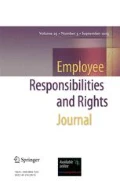Abstract
The present article discusses the state of the science regarding the connection between organizational justice and organizational citizenship behavior (OCB) as reflected by the articles included in this issue. The research described in these articles reaches a conclusion in need of further elaboration—namely, that people will behave altruistically toward the oroganizations in which they work when they believe those organizations have treated them fairly. Various conceptual issues are discussed. These include: the willingness of people to express inequity distress by withholding OCB, the relative importance of procedural justice compared to distributive justice as a determinant of OCB (especially the social aspects of procedural justice), and the extent to which a reduction in OCB may reflect a desire to influence another individual, or the organization in general. A variety of methodological issues are also discussed. In this connection, it is suggested that correlational, questionnaire measures be supplemented by open-ended interview studies as well as laboratory investigations. Moreover, if questionnaires continue to be used, then it is recommended that attempts be made to improve the validity of both measures of justice and OCB.
Similar content being viewed by others
References
Adams, J. S. (1965). Inequity in social exchange. In Berkowitz, L. (Ed.),Advances in Experimental Social Psychology (Vol. 2), 199–245. New York: Academic Press.
Cohen, R. L., & Greenberg, J. (1982). The justice concept in social psychology. In Greenberg, J., & Cohen, R. L. (Eds.),Equity and Justice in Social Behavior, 1–41. New York: Academic Press.
Damon, W. (1977),The Social World of the Child. San Francisco: Jossey-Bass.
Folger, R., & Greenberg, J. (1985). Procedural justice: An interpretive analysis of personnel systems. In Rowland, K. M., & Ferris, G. R. (Eds.),Research in Personnel and Human Resources Management (Vol. 3), 141–183. Greenwich, CT: JAI Press.
Furnham, A. (1990).The Protestant Work Ethic: The Psychology of Work Beliefs and Behaviors. London: Routledge.
Greenberg, J. (1993). The social side of fairness: Interpersonal and informational classes of organizational justice. In Cropanzano, R. (Ed.),Justice in the Workplace: Approaching Fairness in Human Resource Management, 79–103. Hillsdale, NJ: Lawrence Erlbaum Associates.
Greenberg, J. (1990a). Organizational justice: Yesterday, today, and tomorrow.Journal of Management, 16, 399–432.
Greenberg, J. (1990b). Employee theft as a reaction to underpayment inequity: The hidden cost of pay cuts.Journal of Applied Psychology, 75, 561–568.
Greenberg, J. (1987). A taxonomy of organizational justice theories.Academy of Management Review, 12, 9–22.
Greenberg, J. (1986). Determinants of perceived fairness of performance evaluations.Journal of Applied Psychology, 71, 340–342.
Greenberg, J. (1982). Approaching equity and avoiding inequity in groups and organizations. In Greenberg, J., & Cohen, R. L. (Eds.),Equity and Justice in Social Behavior, 389–435. New York: Academic Press.
Greenberg, J. (1979). Equity, equality, and the Protestant ethic: Allocating rewards following fair and unfair competition.Journal of Experimental Social Psychology, 14, 217–226.
Greenberg, J., & Cohen, R. L. (1982). Why justice? Normative and instrumental interpretations. In Greenberg, J., & Cohen, R. L. (Eds.).Equity and Justice in Social Behavior, 437–469. New York: Academic Press.
Kohlberg, L. (1969). Stage and sequence: The cognitive-developmental approach to socialization. In Goslin, D. (Ed.).Handbook of Socialization Theory and Research, 211–267. Chicago: Rand-McNally.
Krebs, D. (1982). Prosocial behavior, equity, and justice. In Greenberg, J., & Cohen, R. L. (Eds.),Equity and Justice in Social Behavior, 261–308. New York: Academic Press.
Lemer, M. J. (1982). The justice motive in human relations and the economic model of man: A radical analysis of facts and fictions. In Derlega, V., & Grezlak, J. (Eds.),Cooperation and Helping Behavior: Theories and Research, 42–65. New York: Academic Press.
Lind, E. A., & Tyler, T. (1988).The Social Psychology of Procedural Justice. New York: Plenum.
Nisbett, R., & Ross, L. (1980).Human Inference: Strategies and Shortcomings of Social Judgment. Englewood Cliffs, NJ: Prentice-Hall.
Piaget, J. (1965/1932).The Moral Judgment of the Child. New York: The Free Press.
Podsakoff, P. M. & MacKenzie, S. B. (1989).A second generation measure of organizational citizenship behavior. Unpublished working paper, Indiana University.
Sheppard, B. H., & Lewicki, R. J. (1987). Toward general principles of managerial fairness.Social Justice Research, 1, 161–176.
Author information
Authors and Affiliations
Rights and permissions
About this article
Cite this article
Greenberg, J. Justice and organizational citizenship: A commentary on the state of the science. Employ Respons Rights J 6, 249–256 (1993). https://doi.org/10.1007/BF01419448
Issue Date:
DOI: https://doi.org/10.1007/BF01419448




